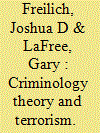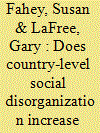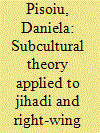|
|
|
Sort Order |
|
|
|
Items / Page
|
|
|
|
|
|
|
| Srl | Item |
| 1 |
ID:
138777


|
|
|
|
|
| Summary/Abstract |
The Iraqi Insurgency (2003–2011) has commonly been characterized as demonstrating the tendency for violence to cluster and diffuse at the local level. Recent research has demonstrated that insurgent attacks in Iraq cluster in time and space in a manner similar to that observed for the spread of a disease. The current study employs a variety of approaches common to the scientific study of criminal activities to advance our understanding of the correlates of observed patterns of the incidence and contagion of insurgent attacks. We hypothesize that the precise patterns will vary from one place to another, but that more attacks will occur in areas that are heavily populated, where coalition forces are active, and along road networks. To test these hypotheses, we use a fishnet to build a geographical model of Baghdad that disaggregates the city into more than 3000 grid cell locations. A number of logistic regression models with spatial and temporal lags are employed to explore patterns of local escalation and diffusion. These models demonstrate the validity of arguments under each of three models but suggest, overall, that risk heterogeneity arguments provide the most compelling and consistent account of the location of insurgency. In particular, the results demonstrate that violence is most likely at locations with greater population levels, higher density of roads, and military garrisons.
|
|
|
|
|
|
|
|
|
|
|
|
|
|
|
|
| 2 |
ID:
138772


|
|
|
|
|
| Summary/Abstract |
In this short essay, we introduce readers to a special issue of Terrorism and Political Violence on criminological approaches to the study of terrorism. In addition to summarizing the eight articles in the issue, we outline some general points about the relationship between criminological thinking and our understanding of terrorism. Our goal is to place the special issue's contributions in context and highlight under-explored issues that future research could address.
|
|
|
|
|
|
|
|
|
|
|
|
|
|
|
|
| 3 |
ID:
138776


|
|
|
|
|
| Summary/Abstract |
This study examines the effects of a measure of country-level social disorganization on levels of terrorist attacks and fatalities in 101 countries from 1981 to 2010. We measure social disorganization as the presence of state instability: revolutionary and ethnic war, adverse regime change, and genocide. The classic social disorganization perspective posits that individuals experiencing these types of rapid social change will be freed from the institutional and informal restraints that bind them to society, and keep them conforming to social norms and laws. We examine the extent to which this reasoning applies to the number of terrorist attacks and fatalities from terrorist attacks occurring in countries. To control for the possibility that better functioning states are better able to prevent terrorist attacks, we include two measures of state capacity. We find that controlling for state capacity and a wide variety of other variables, social disorganization is consistently associated with increases in terrorist attacks and fatalities. We consider implications of the results for future research and policy.
|
|
|
|
|
|
|
|
|
|
|
|
|
|
|
|
| 4 |
ID:
138779


|
|
|
|
|
| Summary/Abstract |
Scholars are increasingly drawing on models and theories from the field of Criminology to offer new insights on terrorist violence. A particularly useful framework by LaFree, Dugan, and Korte works from the assumption that illegal behaviour can be affected by the threat and/or imposition of punishment. It sees the results of the government's intervention in terms of deterrence (state's repressive action leads to a reduction in terrorism violence), and backlash (state's repressive action leads to defiance and retaliation, and to an upsurge of terrorism violence). This article applies this model to a case study of the government's responses to Euzkadi Ta Askatasuna (ETA). It uses a variation of survival analysis technique—Series Hazard—to assess the impact of six major initiatives on the risk of new ETA attacks in the period from 1977 to 2010. Mostly, the results provide support for both backlash interpretations, although important questions regarding interpretation are raised.
|
|
|
|
|
|
|
|
|
|
|
|
|
|
|
|
| 5 |
ID:
138778


|
|
|
|
|
| Summary/Abstract |
Despite several overlaps between crime and terrorism, criminological examinations of terrorism to date have been limited. To fill this gap in the research, we examine several individual and contextual socio-demographic characteristics of a diverse sample of extremists operating in the United States who have committed violent crimes. In addition, we provide a comparative analysis to explain and understand differences between extremists who have committed violent crimes while active in either far-Right, far-Left (including environmental and animal rights extremists), or Al Qaeda and affiliated movements. To assess the impact of external factors on the nature of domestic extremist violence, we also comparatively examine these three types of domestic extremists before and after the September 11, 2001 terrorist attacks. We find several similarities across domestic extremists but many important suspect- and county-level differences as well. We end the paper with suggestions for future research that could extend the criminological study of terrorism.
|
|
|
|
|
|
|
|
|
|
|
|
|
|
|
|
| 6 |
ID:
138775


|
|
|
|
|
| Summary/Abstract |
Suicide terrorism is the most violent and horrifying form of terrorism in the world today. This kind of terrorism causes many fatalities and can throw an entire nation into a state of panic. We usually attribute this kind of terrorism to altruistic motivation, assuming that bombers are willing to sacrifice themselves for a higher cause. The current study uses the criminological theory of Rational Choice to analyze the motivation of jihadist suicide terrorism. By reviewing the religious, personal, and social incentives, we demonstrate that even those who kill themselves in suicide attacks, which are seemingly examples of irrational or altruistic behavior, do so while considering future, self-gratifying benefits. Since this self-destructive behavior is mostly driven not by altruistic motivation but by the anticipation of costs and benefits, we find that there is no fundamental difference between the perpetrators’ motivations and those of other criminals; both groups are committed to maximizing self-gratifying, beneficial behavior.
|
|
|
|
|
|
|
|
|
|
|
|
|
|
|
|
| 7 |
ID:
138780


|
|
|
|
|
| Summary/Abstract |
This study examines whether Criminology's Routine Activities Theory (RAT) and related Lifestyle Theory (LST) can account for variation between the attributes of victims of fatal ideologically motivated attacks (akin to terrorism) and the victims of non-ideologically motivated homicide incidents committed by far-Right extremists in the United States. This article makes four contributions. First, we empirically test Criminology theory in the context of terrorism by using routine activities to devise four core hypotheses to explain differences between the two types of victims. Second, our investigation uniquely includes a non-terrorist comparison group (i.e., victims of homicides committed by extremists for personal reasons like greed). Third, our study focuses on ideological victimization. Terrorism researchers have usually ignored victims because of the difficulty in accessing the necessary data. Finally, we also make a methodological contribution by showing that criminology can build upon the terrorism literature by utilizing open-sources. Using data from the Extremist Crime Database (ECDB), the results of a multivariate analysis partially supported the hypotheses, showing that RAT and LST offer empirically supported theoretical constructs that have the ability to differentiate between ideological and non-ideological homicides.
|
|
|
|
|
|
|
|
|
|
|
|
|
|
|
|
| 8 |
ID:
138774


|
|
|
|
|
| Summary/Abstract |
Much of the discourse surrounding counterterrorism centers on the inevitability of displacement, or the substitution of another form of terrorist attack in place of the one that has been thwarted. Yet a longstanding tradition of research in situational crime prevention finds that displacement is far from inevitable, and often depends crucially on the specific features of the incidents in question. In fact, crime prevention efforts are often followed by a “diffusion of benefits” (i.e., crime reductions) to incidents, groups, or locations that were not the intended target of the intervention. The current study examines various forms of displacement and diffusion in response to airport metal detectors among terrorist groups that had been involved in the perpetration of aviation attacks prior to their implementation. Using data from the Global Terrorism Database, the findings from interrupted time series models suggest a complex set of displacement and diffusion effects with respect to alternative attack modes, target types, and weapon usage.
|
|
|
|
|
|
|
|
|
|
|
|
|
|
|
|
| 9 |
ID:
138773


|
|
|
|
|
| Summary/Abstract |
This article assesses the applicability of subcultural theories to individual cases of jihadi and Right-wing radicalization in Germany, with a focus on the individual initial situation and motivation for involvement. Within an overall qualitative research design, the article tests deviance/strain and Centre for Contemporary Cultural Studies (CCCS) subcultural theories against four jihadi and three Right-wing extremist cases. The findings show little support for the strain-based status frustration hypothesis, but confirm the illegitimate opportunity structure thesis; modified versions of the CCCS’ resistance, bricolage, and homology concepts; as well as some of the postmodern approaches to agency and cultural cross-fertilization. The jihadi and Right-wing radicals examined here are assertive and purposive agents, strategically using the rich cultural arsenal available in the mainstream and/or other subcultures, while at the same time being themselves influenced by contemporary mainstream preferences of style. The article discusses the implications of these findings for radicalization research and specific subcultural approaches. It argues for a greater focus on both individual agency and the (sub-)cultural context for an improved understanding of individual involvement in political violence.
|
|
|
|
|
|
|
|
|
|
|
|
|
|
|
|
|
|
|
|
|